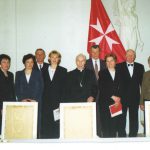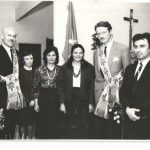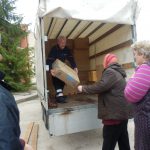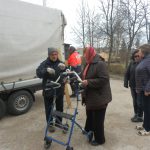The First Year of Maltesers in Lithuania
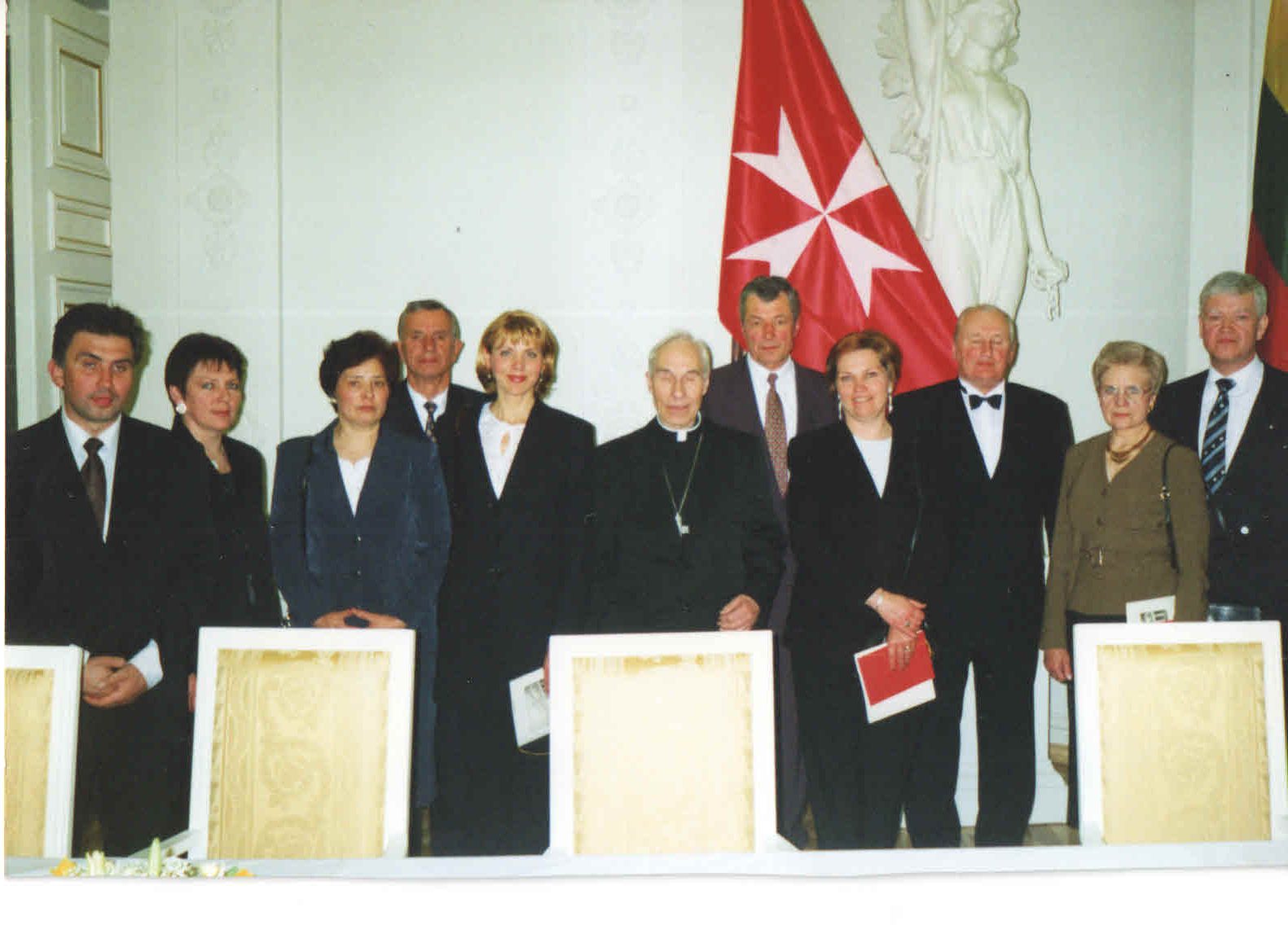
Lithuanian Maltesers are celebrating their 30th year of activity this year. During this time the organisation has grown, changed and implemented many social projects. All these achievements would not been possible without the first members and supporters of the organisation – intellectuals, medics, teachers, clergy and civil servants, as well as the German Maltesers, who were the first Lithuanian teachers and guides.
The poor economic situation has encouraged the search for solutions
Most of the pioneers interviewed recall the early years of the organisation as particularly challenging, but also as a time of unity in a common purpose. At that time, Lithuania was taking its first steps towards independence, and hospitals lacked even the most basic supplies – bandages, cotton wool, medicines. A large part of society was suffering from food shortages and poverty. The country’s economy was plagued by the blockade imposed by Moscow, and unemployment was rising due to the bankruptcy of companies under the union subordination. These circumstances encouraged the search for solutions, to cooperate with the German Maltesers, to learn from their practices and to apply new knowledge to improve the situation of a country in recovery.
The first Lithuanian groups, encouraged by the German Maltesers, settled not only in the major cities like Vilnius, Kaunas, Klaipėda, Šiauliai, but also in smaller towns such as Kaišiadorys, Ignalina, Vilkaviškis, Marijampolė, etc.
Maltesers rescued a key witness of the Medininkai massacre
German Maltesers came to Lithuania with humanitarian aid immediately after the events of January 13th and faced tanks in the streets, saw how poor the Soviet–era equipment was in the country’s major hospitals, where people who had suffered from the hands of the Soviet army were waiting for urgent help. From that moment, aid shipments began to arrive in Lithuania regularly and in large quantities, and the first Lithuanian Maltesers groups were formed to receive and coordinate the incoming aid for the medical institutions. On 26th October 1991, „Lietuvos aidas“ wrote: “The Order of Malta continues to provide us with abundant humanitarian aid. From this year on May, they have sent us 19 vans of supplies from the East German Army Medical Service. <…> These charity shipments have been distributed to 36 medical institutions and 13 organisations.”
Not only medical and nursing institutions have received Maltesers’ help – patients in special needs have been sent to Germany for treatment. One of them is Tomas Šernas, Lithuanian customs officer and the only survivor of the Medininkai tragedy.
First initiative groups in the regions and their first results
When Lithuania became independent in 1991, Romualdas Sveikata, the head doctor of Vilkaviškis Hospital, was fascinated by Maltesers’ activities while visiting Germany and brought the idea of it back home. By the end of the year, people of Vilkaviškis were already enjoying their first work – the establishment of a home for the elderly, which became a Maltesers’ meeting centre.
“At that time, everything was needed – food, clothes, nursing aids, medicines, etc. I remember that in the first year the clothes distribution room was opened, about 1 500 people visited it. We worked closely with the municipality’s social department and got the contacts of people in need. We visited and asked them what they need the most” says Angelija Bakšienė, the leader of the Vilkaviškis group.
Audronė Petraškienė, the leader of the Kaišiadorys group, says that one of the biggest challenges for the founders of the group was to find suitable premises.
“After the group was founded, the biggest problem was to find suitable premises. The volunteers didn’t have enough money, so at first they rented an apartment. Later, when the activities were in progress, the German Maltesers provided support for the construction of the house. Until these days we are still operating in this house, which the Germans help to maintain.”
Charity from Germany used to arrive by the ship to Klaipėda
Much of the charity provided by the Order of Malta came through the port of Klaipėda. In 1991, the organisation’s Former President, Romas Abunevičius, worked in the Health Department of Klaipėda Municipality. Part of his work was related to Maltesers – he had to meet and see off delegations of the German Maltesers, to help with the necessary paperwork at the customs office and to make sure that the charity reached the hospitals.
“At that time, customs procedures were very complicated and time–consuming. We used to wait five hours or more for a ship in heavy weather and blizzards. Maltesers were arriving late at night with the charity. At that time there was a lack of hotels in Klaipėda, so the guests slept in my house, and I guarded their cars”, – Romas, Former President of MOPT and current Chairman of the Ethics Commission of Maltesers, shares his memories.
Dispatches from German families to Ignalina residents
Vidutė Marija Ektienė, one of the founders of the Ignalina group, remembers the first charity parcel that reached the group: “We were very surprised to find many German letters in the pockets of the clothes we received. We asked one of the volunteers, a German teacher, to translate the letters. It turned out that the German families wanted to get to know the Lithuanian families and send them aid.”
In cooperation with social workers, 17 large families were selected to start communicating with the Germans through letters. The group leader says that these families received a personalized charity according to their individual needs.
Help for disabled people in Marijampolė
Marija Miliauskienė, the current leader of the Marijampolė group, tells how her brother Vitas Šimkonis founded Maltesers’ group. “The group consisted mainly of doctors and teachers, so the activities were primarily aimed at helping people in need of medical assistance. Soon we saw that the people who needed it the most were the “wheelchair users”, says Marija. “Most of the charity was compensation equipment, medical equipment and other supplies that travelled from Germany to the hospital in Marijampolė.” Close ties have been established between Maltesers’ medical staff at the hospital, the staff of the Wildeshausen Hospice and Maltesers. Three surgeons and one operating room nurse were given a free internship in Germany, after which they returned home and performed the first laparoscopic surgery in Lithuania with a laparoscope donated from Germany.
The difficult situation in Kaunas hospitals
Dr. Stasys Gendvilis, one of the founders of the Kaunas group, says that while working in a hospital and interacting with patients, he realised that it was not only the hospital that needed urgent help, but also the people. A colleague of his had established contacts with the German Maltesers, so the doctors quickly decided to set up a group to receive and distribute charity.
“Hospitals were in lack of bandages, aids, medicines and even bedding. There were also many poor people living in the area. Soon enough, we started to make soup ourselves and serve it to the needy. At first, people didn’t understand what this process was about, they thought we were running a café. Parents were afraid to let their children go to our Children Day Care Center because they didn’t know anything about the organisation. We had to take time to explain the principles and values of Maltesers’ activity and to gain their trust”, – says the doctor about the beginning of the Kaunas group.
A charity canteen has been set up in Šiauliai
In Šiauliai, the initiators of Maltesers’ group were also medics, led by doctor Kazimieras Ščeponavičius. The city’s hospitals were in a difficult situation, so the task of the first Maltesers was to look for a way to provide the hospitals with the necessary equipment and materials. “The German Maltesers brought functional beds, an incubator for premature babies, a mobile fluorograph, medicines and dressings to the Šiauliai Republican Hospital. For the Children’s Hospital, they provided baby food, toys, and expensive medicines for children with rare and very serious illnesses. A charity canteen was set up jointly with the Germans to provide food at the catering places in Cathedral of Saints Peter and Paul and St George’s Church.”
Medical facilities needed help again during the pandemic
During the first years of Maltesers in Lithuania, 12 Maltesers’ groups were established in different cities with 116 members. Today, Maltesers are active in 43 cities and towns with 1 500 volunteers. During the 30 years of the organisation’s existence, not only the number of members has grown and the activities have changed, but they have always been targeted at the weakest places, where immediate help is needed. During the pandemic years, in addition to social activities, Maltesers returned to medical and nursing institutions with help – they have been on duty, delivered food to those who worked day and night in hospitals, and collected funds to buy personal protective equipment, which was so catastrophically lacking for the medical staff at the beginning of the pandemic.
